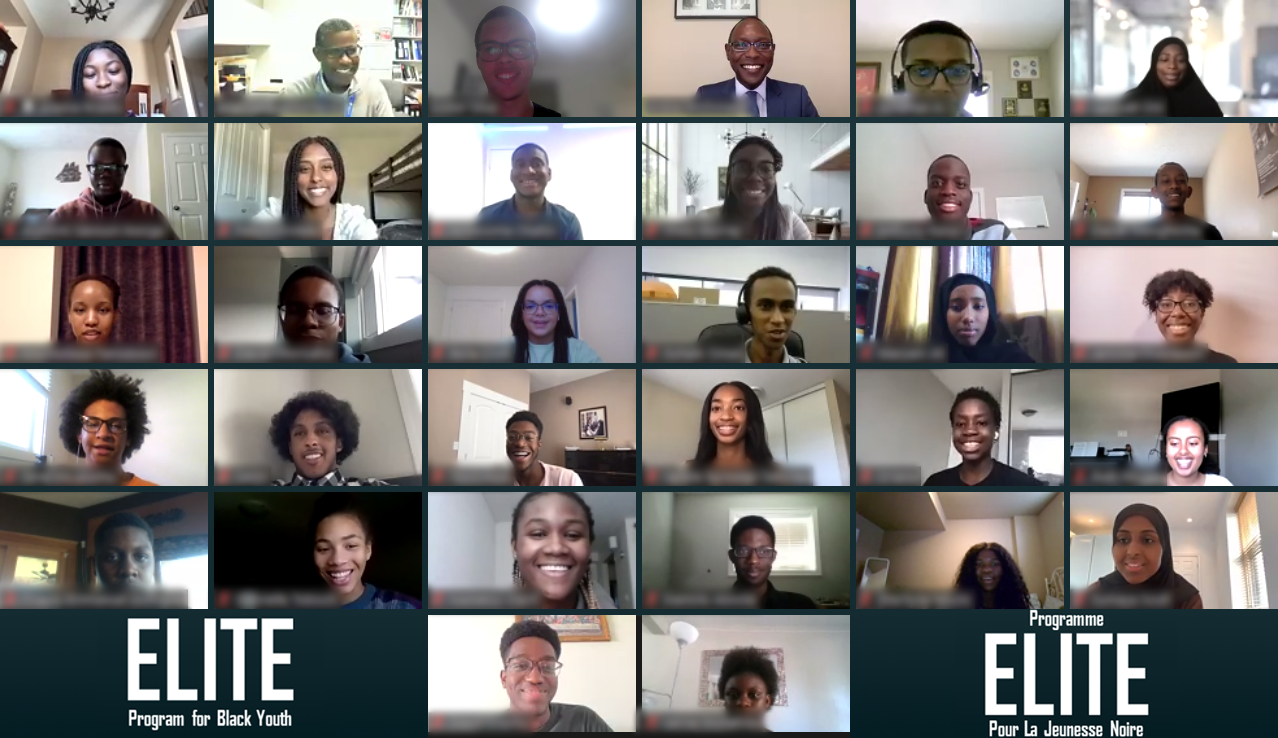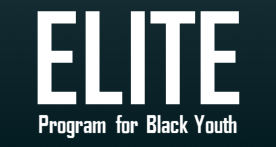
Author: Tom Ndekezi
Tag: The ELITE Program for Black completes its first year and is now on to the second year of exceptional training, learning, and engagement
Date: 31 January 2022
After 16 weeks of programming, 38 work placements, and over 21,000 hours of hands-on work experience, the ELITE Program for Black Youth wrapped up its inaugural year of operation in 2021.
To reflect on a year of work, learning, and advocacy for Black youth, ELITE Program participants, staff, and partners came together on August 26, 2021 for an afternoon of presentations at the Program’s Final Intern Technical Workshop event. The afternoon saw program participants present their experiences from a summer spent working with organisations like University of Alberta, Enbridge, Alberta Health Services, the City of Edmonton, and Token Naturals. The projects themselves ranged from interns testing traffic control systems used by fire departments to researching the receptors involved in the contraction of malaria. But despite the variety of topics highlighted across the dozens of presentations, one thing was clear from the mood of the day: after a successful inaugural year, the ELITE Program’s work is just getting started.
Different from the Start
Launched in December 2020, the ELITE Program for Black Youth came from unconventional beginnings to say the least. With the world still adjusting to widespread lockdown measures in 2020, most organisations were either shuttering their windows, scaling back programming, or scrambling to pivot to digital. Conventional wisdom might have counselled against starting an initiative in the midst of a global pandemic, especially one that would require significant seed funding. But luckily for ELITE Program founder Dr. André McDonald, this was not a conventional problem.
The shock of the pandemic made it clear that a lot of spaces were about to change for good, the workplace chief among them. While the ability to innovate, work with technology, and self-start have long been touted as the skills of tomorrow, the blindsiding effect of the pandemic meant that they quickly became the skills of today. The dash to ‘COVID-proof’ the workplace also meant that long held professional norms were exposed as being inefficient, while approaches that previously existed on the fringes became commonplace. Whether it was project teams ‘hopping on a Zoom’ rather than booking cross-country flights, organisations digitising documents to improve accessibility, or working from home becoming a day-to-day necessity, the COVID-19 pandemic meant that the future of work came a lot sooner than expected.
The seeds of the ELITE Program were also planted during a summer of racial reckoning, spurred on by the killings of George Floyd, Ahmaud Aubery, and Breonna Taylor. In the wake of a wave of global protests, the fight against systemic anti-Black racism was being waged not just in police departments and courtrooms, but in every sphere of public life. While governments, communities, and individuals reflected on their own contributions to systems of oppression, so did business and corporations. The picture that emerged was of a corporate world where Black folks were often either underappreciated, underrepresented or outright overlooked, but also one that was ready to begin to take positive, proactive steps toward making things right.
Between the new realities brought on by the pandemic and the age-old problems resurfaced by the George Floyd protests, the need for equitable approaches to the future of work could not have been more apparent. As a heat transfer expert, Dr. McDonald understood the importance of not just tapping into the heat of the cultural moment, but creating something that could sustain itself across time. For him, there was only one way to do it: a comprehensive work experience program focused on advocacy, work-integrated learning, future technologies, and most importantly, Black youth.
“There haven't been a lot of opportunities presented to Black youth in the past that require them to innovate,” Dr. McDonald says, reflecting on the inspiration behind what would eventually become the ELITE Program. “There’s been a culture of Black youth going to school, getting A’s, getting the job, working a 9-5, and that’s it. But I wanted to change that. I wanted Black youth to come in and think on an innovation wavelength. I wanted them to think about how they can take the knowledge they get through their work-integrated experience, actually innovate with it if they can, and then start to think, How can I create a business opportunity with my new science, technology, and engineering learning?”
A Winning Network
To get the ELITE Program from seed to start-up, Dr. McDonald recruited the help of friends and colleagues from across the continent. For the program’s co-director, Dr. McDonald enlisted the expertise of Dr. Adetola Adesida, a professor in the University of Alberta’s Department of Surgery. Dr. Sophie Yohani, a professor from the Department of Educational Psychology, signed on as the program’s Coaching and Counselling Lead. To round off the executive team of the program’s international 13-member Steering Council, Dr. McDonald also reached out to Dr. Sédami Gnidehou, assistant professor at Campus Saint-Jean’s Department of Biology and the ELITE Program’s Francophone Lead. Dr. James Kariuki recently joined the Steering Council to support program development and pedagogy given his experience as Associate Dean at the University of Alberta’s Augustana Campus.
“It was important for us to ensure that the program valued equity, diversity, and inclusion across the Black community, rather than setting up a program that implies that the Black community is homogeneous,” Dr. McDonald says. “[The Black community] is highly heterogeneous, and we wanted to make sure that its diversity was a big part of our program as well. So while technological skills development drove the creation of the program, social and emotional skills development, as well as diversity and inclusion, was also part of it as well.”
In addition to being headed by some of the University of Alberta’s finest minds, the ELITE Program was also intentional about forming relationships with like-minded organisations. Through its partnerships with organisations such as the University of Alberta Black Students’ Association and RBC Future Launch, the ELITE Program was able to offer its first-year cohort programs like entrepreneurship training and financial literacy workshops.
“When [RBC] is looking at funding programs, we want to be a transformational philanthropist, not a transactional one,” says Jerilynn Daniels, Regional Director, Community Marketing and Citizenship for RBC in Alberta and Territories. “We think about how we can harness the power of our employees to bring value to our partners, whether that's through skills development, or mentorship. And so with the ELITE Program, we have the additional opportunity for our folks to lead financial literacy sessions with the participants within the program.”
Bolstered by the Steering Council’s breadth of expertise and a comprehensive network of corporate and community partners, it is little surprise that the ELITE Program’s inaugural cohort was such a success. If the bright-eyed presentations delivered at the wrap-up event were not sufficient proof to that end, you would not have to look much further than the glowing testimonies from actual program participants.
“It’s really cool to be in this environment where you’re surrounded by other Black associates who are also working towards their own success,” says third-year finance student Tinashe Muzah, speaking to Folio, the University of Alberta’s official brand journalism site. “It’s definitely something I haven’t had before: mentors who understand the specific nuances of the Black experience in a professional sense.”
“It just feels really good to put what I’m learning into practice,” adds third-year physiology student Imani Murray, who spent her summer working as a research assistant at the U of A’s Neuromuscular Control and Biomechanics Laboratory. “It’s encouraging to have a reminder why I’m studying what I’m studying.”
Firm Foundations
While the success of the ELITE Program’s inaugural year may seem like a crowning achievement, in reality, it is the foundation for the Program’s even loftier ambitions.
“This year was our benchmark catalyst for a larger initiative that will support more students,” says Dr. McDonald. “We supported about 40 students this year and we would like to increase that number to maybe 60 or 80 going forward into next year and the year after that. We also would like to take the Program national as well, but in a gradual way.”
The ELITE Program is already set to expand to Ottawa in 2022, and there is little doubt that the Program’s first-of-its-kind approach will be a hit in communities across the country and North America. It is also a sentiment that is shared across the ELITE Program family.
“This year was our test launch, but it would be great if the program then goes national and maybe even international,” says program co-director, Dr. Adetola Adesida. “We know that it's a working model, and when you think about it, Black youth everywhere aspire for the same things more or less. They want to be successful, they have a lot of energy, and they have got a lot of ideas, but they also need role models to show them the path.”
“How wonderful would it be if a national program was spawned from a partnership that was created right here [in Alberta],” says RBC’s Jerilynn Daniels. “And so the hope that the ELITE Program will go national is shared not just by RBC, but by the other two funders as well [Future Skills Centre and the Counselling Foundation of Canada]. We hope that this will be a tremendous launchpad for these young people that are having the opportunity to be the first into this program to really help shape it.”
The strengths of the ELITE Program’s model invariably lie in its focus on hands-on work experience, wellness and career coaching, technological skills development, and one-to-one mentorship and advocacy for Black youth. The Steering Council’s impressive fundraising efforts also minimised the financial burden placed on employers, while allowing students to not have to choose between paid work and meaningful skills development.
“I've had conversations with multiple researchers and various people about the type of person that can volunteer their time for either an unpaid internship or volunteer positions, and you have to be pretty privileged to be able to not get paid for your work,” says Dr. Kay Rittenbach, Assistant Scientific Director at Alberta Health Services and an ELITE Program internship host this past summer. “The fact that these were paid internships was a huge plus from my perspective.”
“The fact that these were paid internships was really important to us,” adds Counselling Foundation of Canada President Bruce Lawson, reflecting on the Foundation’s decision to help fund the ELITE Program in its inaugural year. “There are a lot of internships out there that are unpaid, which is typically a barrier for anyone who comes from a lower socio-economic background — whether they’re Black, Indigenous, or belonging to another racialized community.”
That commitment to optimising the work-placement experience for both participants and employers alike hasn’t just set the ELITE Program apart, but it has also made the program — as well as its interns — quick favourites among internship hosts.
“ELITE Program interns are very impressive,” says Keenan Pascal, CEO of Token Naturals in Edmonton, Alberta and an ELITE Program internship host. “Right from the off, they're very well-rounded and open. You can see that they appreciate the time and effort the business is putting into them — so they're very respectful on that side — and it shows with how eager they are to get their hands dirty.”
“You don't really need to train [the students] much because they're already outstanding from the beginning,” echoed Dr. Hossein Rouhani, Associate Professor in the University of Alberta’s Faculty of Engineering and Neuromuscular Control & Biomechanics Laboratory. “I would highly encourage people to be internship hosts for the ELITE Program, although on the other hand, I also want to have all the interns to myself.”
Undeniable Impact
When the ELITE Program’s interns, Steering Council Members, friends and family members came together for the Final Internannual Technical Workshop event in August 2021, a lot still had not changed from the year before. Although the emergence of four different vaccines against COVID-19 provided hope for the future, elevated case counts meant that the event still had to occur in an all too familiar virtual setting. Despite a year of protest, action, and reflection bringing the realities of anti-Black racism out into the open, systemic injustice was still just as pervasive as it was in 2020. Across Canada and around the world, record summer temperatures pointed to the greatest threat of our time, and the urgent need for sustainable future innovation in the face of global climate change.
As the ELITE Program interns clicked through their slides marked with technical and scientific diagrams of project management databases, sustainable menstrual products, and corrosion-resistant pipeline materials, a lot of things still had not changed in the world. The peril of the present and the uncertainty of the future were just as real then as they were four months before at the start of the program. One thing had changed though, and its presence was evident in the enthusiastic presentations on show. In the space of four months, under incredibly difficult circumstances, 38 formidable Black youth transformed from student interns into engineers, scientists, designers, managers, and problem solvers in training. With a bit of guidance, advocacy, hands-on work experience, and coaching — as well as a lot of personal and community investment — the future seemed a little brighter, and the present a little more manageable.

